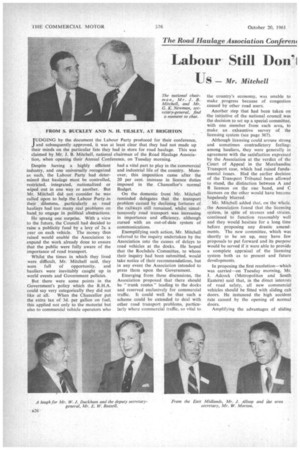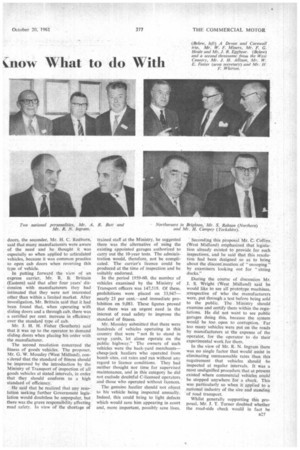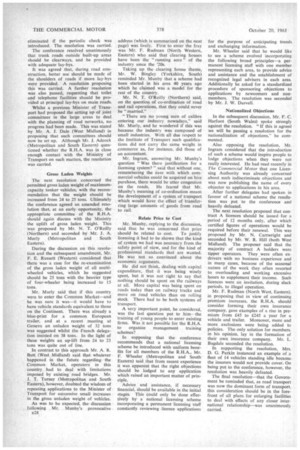Labour Still non'i (now What to do With
Page 60

Page 61

Page 62

If you've noticed an error in this article please click here to report it so we can fix it.
TUDGING by the document the Labour Party produced for their conference,
and subsequently approved, it was at least clear that they had not made up their minds on the particular fate they had in store for road haulage. This was claimed by Mr. J. B. Mitchell, national chairman of the Road Haulage Association, when opening their Annual Conference, on Tuesday morning.
Despite having a highly efficient industry, and one universally recognized as such, the Labour Party had determined that haulage must be controlled, restricted, integrated, nationalized or wiped out in one way or another. But Mr. Mitchell did not consider he was called upon to help the Labour Party-in their dilemma, particularly as road hauliers had too many real problems on hand to engage in political abstractions.
He sprang one surprise. With a view to the future, the Council had decided to raise a publicity fund by a levy of 2s. a year on each vehicle. The money thus raised would enable the Association to expand the work already done to ensure that the public were fully aware of the importance of road transport.
Whilst the times in which they lived were difficult, Mr. Mitchell said, they were full of opportunity, and hauliers were inevitably caught up in world events and Government policies.
But there were some points in the Government's policy which the R.H.A. could say very categorically they did not like at all. When the Chancellor put the extra tax of 3d. per gallon on fuel, this applied not only to the motorist but also to commercial vehicle operators who had a vital part to play in the commercial and industrial life of the country. Moreover, this imposition came after the 20 per cent. increase in licence duties imposed in the Chancellor's normal Budget.
On the domestic front Mr. Mitchell reminded delegates that the transport problem caused by declining fortunes of the railways still remained, whilst simultaneously road transport was increasing in importance and efficiency, although cursed with an out-of-date system of communications.
Exemplifying such action, Mr. Mitchell referred to the inquiry undertaken by the Association into the causes of delays to road vehicles at the docks. He hoped that the Rochdale Committee, to whom their inquiry had been submitted, would take notice of their recommendations, but in any event the Association intended to press them upon the Government.
Emerging from these discussions, the Association proposed that there should be "trunk routes" leading to the docks and reserved exclusively for commercial traffic. It could well be that such a scheme could be extended to deal with other road transport problems, particularly where commercial traffic, so vital to
the country's economy, was unable to make progress because of congestion caused by other road users.
Another step that had been taken on the initiative of the national council was the decision to set up a special committee, with one member from each area, to make an exhaustive survey of the licensing system (see page 367).
Although licensing could arouse strong and sometimes contradictory feelings among hauliers, they were generally in agreement with the satisfaction expressed by the Association at the verdict of the Court of Appeal in the Merchandise Transport case, which had raised fundamental issues. Had the earlier decision of the Transport Tribunal been allowed to stand, the distinction between A and B licences on the one hand, and C licences on the other would have become hopelessly blurred.
Mr. Mitchell added that, on the whole, the Association found that the licensing system, in spite of stresses and strains, continued to function reasonably well and they would hesitate for a long time before proposing any drastic amendments. The new committee, which was shortly to be set up, may have few proposals to put forward and its purpose would be served if it were able to provide a complete appraisal of the licensing system both as to present and future developments.
In proposing the first resolution—which was carried—on Tuesday morning, Mr. J. Adcock (Metropolitan and South Eastern) said that, in the direct interests of road safety, all new commercial vehicles should be fitted with sliding cab doors. He instanced the high accident rate caused by the opening of normal doors.
Amplifying the advantages of sliding doors, the seconder, Mr. H. C. Redburn, said that many manufacturers were aware of the need and he thought it was especially so when applied to articulated vehicles, because it was common practice to open cab doors when reversing this type of vehicle.
In putting forward the view of an express carrier, Mr. R. B. Brittain (Eastern) said that after four years' discussion with manufacturers they had intimated that they were not interested other than within a limited market. After investigation, Mr. Brittain said that it had been found that, when operating with sliding doors and a through cab, there was a certified per cent. increase in efficiency over the standard type of cab.
Mr. J. H. H. Fisher (Southern) said that it was up to the operator to demand sliding doors when placing his order with the manufacturer.
The second resolution concerned the fitness of goods vehicles. The proposer, Mr. G. W. MousIey (West Midland), cons:dered that the standard of fitness should be improved by the introduction by the Ministry of Transport of inspection of all goods vehicles at stated intervals, in order that they should conform to a high standard of efficiency.
He said that he realized that any resolution seeking further Government legislation would doubtless be unpopular, but there was the grave responsibility affecting road safety. in view of the shortage of
trained staff at the Ministry, he suggested there was the alternative of using the existing appointed garages authorized to carry out the 10-year tests. The administration would, therefore, not be complicated. The carrier's licence could be produced at the time of inspection and be suitably endorsed.
In the period 1959-60, the number of vehicles examined by the Ministry of Transport officers was 147,519. Of these, prohibitions were placed on 33,947— nearly 25 per cent.—and immediate prohibition on 9,083. These figures proved that there was an urgent need in the interest of road safety to improve the standard of fitness.
Mr. Mousley submitted that there were hundreds of vehicles operating in this country that were "not fit to stand in scrap yards, let alone operate on the public highway." The owners of such vehicles were the back-yard merchantscheap-jack hauliers who operated from bomb sites, cut rates and ran without any regard to licence conditions. They had neither thought nor time for supervised maintenance, and in this category he did not exclude doubtful C-licensed operators and those who operated without licences.
The genuine haulier should not object to his vehicle being inspected annually. Indeed, this could bring to light defects which would save him appearing in court and, more important, possibly save lives.
Seconding this proposal Mr. C. Collins
(West Midland) emphasized that legislation already existed to provide for such inspections, and he said that this resolution had been designed so as to bring about the discont:nuation of " snooping " by examiners looking out for "sitting ducks."
During the course of discussion Mr. J. S. Wright (West Midland) said he would like to see all prototype machines. irrespective of who the manufacturers were, put through a test before being sold to the public. The Ministry should examine and certify them within the.regulations. He did not want to see public garages doing this, because the system would be too open to corruption. Far too many vehicles were put on the roads by manufacturers at the expense of the operator, for the operator to do their experimental work for them.
In the view of Mr. R. N. Ingram there was no single factor that would assist in eliminating unreasonable rates than this requirement that vehicles should be inspected at regular intervals. It was a most undignified procedure that at present existed where commercial vehicles could be stopped anywhere for a check. This was particularly so when it applied to a national industry of the size and standing of road transport.
Whilst generally supporting this proposal, Mr. J. T. Turner doubted whether the road-side check would in fact be n27 eliminated if the periodic check was introduced. The resolution was carried.
The conference resolved unanimously that trunk roads outside built-up areas should be clearways, and be provided with adequate lay-bys.
It was agreed that, during road construction, better use should be made of the shoulders of roads if more lay-bys were provided. A resolution proposing this was carried. A further resolution was also passed, requesting that toilet and telephone facilities should be provided at principal lay-bys on main roads.
Whilst a previous Minister of Transport had proposed the setting up of joint committeesin the large areas to deal with the planning of road networks, no progress had been made. This was stated by Mr. A. I. Dale (West Midland) in proposing that such committees should now be set up. Although Mr. J. Adcock (Metropolitan and South Eastern) questioned whether the R.H.A. was in close enough contact with the Ministry of Transport on such matters, the resolution was carried.
Gross Laden Weights The next resolution concerned the permitted gross laden weight of maximumcapacity tanker vehicles, with the recommendation that the weight should be increased from 24 to 25 tons. Ultimately the conference agreed an amended resolution that, at an early opportunity, the appropriate committee of the R.H.A. should again discuss with the Ministry the uplift of gross laden weight. This was proposed by Mr. N. T. O'Reilly (Northern) and seconded by Mr. J. A. Murly (Metropolitan and South Eastern).
During the discussion on this resolution and the subsequent amendment, Mr. F. E. Russett (Western) considered that there was a case for the re-examination of the gross laden weight of all multiwheeled vehicles, which he suggested should be 25 tons with the heavier type of four-wheeler being increased to 15 tons.
Mr. Murly said that if this country were to enter the Common Market—and he was sure it was—it would have to have vehicle standards equivalent to those on the Continent. There was already a blue-print for a common European trailer, and at a recent meeting at Geneva an unladen weight of 32 tons was suggested whilst the French delegation insisted on 38 tons. In the light of these weights an up-lift from 24 to 25 tons was quite out of line.
In contrast to this approach Mr. A. R. Butt (West Midland) said that whatever happened in the future regarding the Common Market, operators in this country had to deal with limitations imposed by existing road bridges. Mr. J. T. Turner (Metropolitan and South Eastern), however, doubted the wisdom of repeating applications to the Minister of Transport for successive small increases in the gross unladen weight of vehicles.
As was to be expected, the discussion following Mr. Munby's provocative
a28 address (which is summarized on the next page) was lively. First to enter the fray was Mr. F. Rudman (North Western, Eastern) who said that clearing houses have been the "running sore" of the industry since the '20s.
Taking up the clearing house theme, Mr. W. Bingley (Yorkshire, South) reminded Mr. Munby that a scheme had been started in his area 40 years ago which he claimed was a model for the rest of the country.
Mr. N. T. O'Reilly (Northern) said, on the question of co-ordination of road and rail operations, that they could never be "married."
" There are no young men of calibre entering our industry nowadays," said Mr. Murly, and he wondered if this was because the industry was composed of small industries. With all due respect to the Institute of Transport such qualifications did not carry the same weight in commerce as, for instance, did those of an accountant.
Mr. Ingram, answering Mr. Munby's question "Was there justification for a licensing system?" said that without one, remembering the ease with which commercial vehicles could be acquired on hire purchase, there would be utter congestion on the roads. He feared that Mr. Munby's meaning of co-ordination meant the development of a system of transport which would have the effect of transferring large amounts of goods from road to rail.
Relate Price to Cost Mr. Munby, replying to the discussion, said that he was concerned that price should be related to cost. To justify licensing it had to be shown that the kind of system we had was necessary from the safety point of view, and for the kind of professional standards that are wanted. He was not so convinced about • the economic arguments.
He did not think, dealing with capital expenditure, that it was being wisely spent, but it was not right to say that nothing should be spent on the railways at all. More capital was being spent on roads today than on railway tracks and more on road vehicles than on rolling stock. There had to be both systems of transport.
A very important point, he considered, was the last question put to him— the training of young people to enter existing firms. Was it not possible for the R.H.A. to organize management training schemes?
In supposing that the conference recommends that a national licensing scheme be introduced with uniform benefits for all members of the R.H.A., Mr. F. Wheeler (Metropolitan and South Eastern) said that from recent experience it was apparent that the right objections should be lodged to any application which raised an important matter of principle.
Advice and assistance, if necessary financial, should be available in the initial stages. This could only be done effectively by a national licensing scheme incorporating a permanent licensing staff constantly reviewing licence applications
for the purpose of anticipating trends and exchanging information.
Mr. Wheeler said that he would like to see a scheme evolved incorporating the following broad principles—a permanent licensing staff with one member representing each area, to provide advice and assistance and the establishment of recognized legal advisers in each area. Additionally he asked for a standardized procedure of sponsoring objections to applications by newcomers and nonmembers. The resolution was seconded by Mr. J. W. Darvell.
Nationalized Objections In the subsequent discussion, Mr. F. C. Harfoot (South Wales) spoke strongly against the resolution. "If this is agreed we will be passing a resolution for the nationalization of objections," he commented.
Also opposing the resolution, Mr. Ingram considered that the introduction of such a scheme would inspire people to lodge objections when they were not really interested. He had read recently in The Commercial Motor that one Licensing Authority was already concerned about such indiscriminate objections and was now publishing the name of every objector to applications in his area.
After further delegates had spoken in favour of a national scheme the resolution was put to the conference and heavily defeated.
The next resolution proposed that contract A licences should be issued for a period of 12 months only, after which certified figures of operations would be required before their renewal. This was proposed by Mr. N. Cartwright and seconded by Mr. W. R. Hill (both West Midland). The proposer said that the majority of contract A holders were tipper operators. They were often exdrivers with no business experience and in many cases, because of the seasonal nature of the work they often resorted to overloading and working excessive hours to supplement their income. Such licences were an invitation, during slack periods, to illegal operation.
Mr. F. Rudman (North West, Eastern). in proposing that in view of continuing premium increases, the R.H.A. should consider forming their own insurance company, gave examples of a rise in premium from £45 to £245 a year for a vehicle and trailer. Moreover, more and more exclusions were being added to policies. The only solution for members. in his opinion, lay in the formation of their own insurance company. Mr. L. Bugdale seconded the resolution.
In supporting the resolution. Mrs. D. G. Parkin instanced an example of a fleet of 14 vehicles standing idle because the insurers would not provide cover. On being put to the conference, however, the resolution was heavily defeated.
The final resolution—that the Government be reminded that, as road transport was now the dominant form of transport. this consideration should be in the forefront of all plans for enlarging facilities to deal with effects of any closer international relationship—was unanimously carried.




































































































































